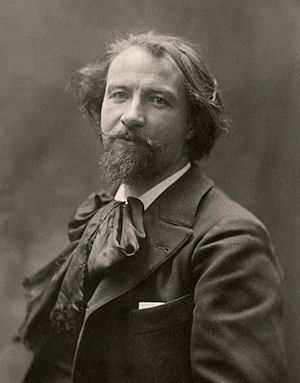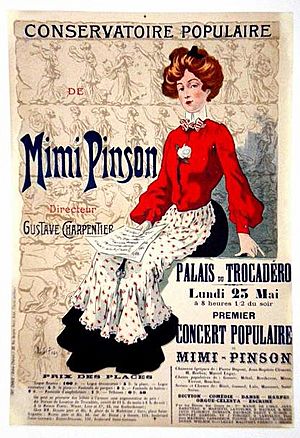Gustave Charpentier facts for kids
Gustave Charpentier (born June 25, 1860 – died February 18, 1956) was a French composer, someone who writes music. He is most famous for his opera called Louise. An opera is like a play where the story is told mostly through singing, with music played by an orchestra.
Contents
Life and Career
Early Life and Studies
Gustave Charpentier was born in a town called Dieuze, in France. His father was a baker. A kind person helped him study the violin at a music school in Lille. Later, in 1881, he went to the famous Paris Conservatoire in Paris. There, he learned how to compose music from a well-known teacher named Jules Massenet. Gustave was known for wanting to surprise his teachers with his ideas!
In 1887, he won a very important award called the Prix de Rome for his cantata Didon. A cantata is a piece of music for singers and instruments. This award allowed him to live and study in Rome for a while. During this time, he wrote an orchestral suite called Impressions d'Italie. A suite is a collection of music pieces for an orchestra. He also started working on the story and music for his most famous work, the opera Louise. The story or words of an opera are called the libretto.
The Success of Louise
After his time in Rome, Charpentier returned to Paris and lived in the Montmartre area. He continued to compose, writing songs based on poems by famous writers like Charles Baudelaire. Eventually, he finished Louise, and it was chosen to be performed at the Opéra-Comique theater. This opera showed a realistic picture of everyday life for working-class people in Paris. It is sometimes seen as a French example of verismo opera, which means it focuses on real-life stories and emotions.
The first performance, or premiere, of Louise happened on February 2, 1900. It was a huge success right away! Soon, this opera was being performed all over Europe and America, making Charpentier very famous. It also helped start the career of a Scottish singer named Mary Garden, who sang the main role of Louise in an early performance.
Louise is still performed sometimes today. One of the songs from the opera, called "Depuis le jour," is a very popular piece for singers to perform in concerts.
Helping Young Women
In 1902, Charpentier started something special called the Conservatoire Populaire Mimi Pinson. His goal was to give free art education to young working women in Paris. However, after this, he didn't write much new music. He worked on a follow-up to Louise called Julien, ou la vie du poète. But when it was first performed in 1913, it wasn't very popular and was quickly forgotten. After that, Charpentier wrote very little new music.
Even though he didn't compose much, he was not someone who hid away. During World War I, he started groups to help wounded soldiers. He received a very important French award called the Légion d'honneur in 1900. He was given even higher levels of this award in 1930 and 1950. Gustave Charpentier passed away in Paris at the age of 95.
Main Compositions
Here are some of Gustave Charpentier's most important musical works:
- Didon – 1887
- Impressions d'Italie – 1892
- La vie du poète – 1892
- Sérénade à Watteau – 1896
- La couronnement de la muse – 1897
- Louise – 1900
- Munich – 1911
- Julien, ou La vie du poète – 1913
- L'amour au faubourg – 1913 (never performed)
- Orphée – 1931 (not finished)
- Songs
See also
 In Spanish: Gustave Charpentier para niños
In Spanish: Gustave Charpentier para niños
 | Mary Eliza Mahoney |
 | Susie King Taylor |
 | Ida Gray |
 | Eliza Ann Grier |



